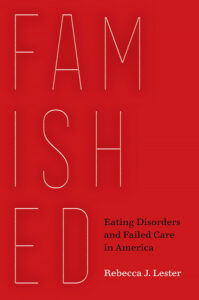Video courtesy of Arts & Sciences
A new book from a cultural anthropologist at Washington University in St. Louis explores a topic that impacts and kills almost as many people in the United States as the opioid crisis, yet receives a fraction of the sympathy, support or funding.
In “Famished: Eating Disorders and Failed Care in America,” Rebecca Lester, associate professor of sociocultural anthropology in Arts & Sciences, gives a rare inside view of eating disorders and their treatment that is compassionate and personal, while also academically rigorous.
“I have published on the topic of eating disorders for more than 20 years,” Lester said, “though ‘Famished’ is my first book-length text on the subject and represents the full fruition of these decades of research, practice and experience.”
The topic also hits close to home.
 “I have struggled with anorexia, bulimia and binge eating for many years,” Lester said. “I was hospitalized twice, at 11 and 18, and was very near death. But I came through and went on to become a professor and clinician. I want people to realize there is hope.”
“I have struggled with anorexia, bulimia and binge eating for many years,” Lester said. “I was hospitalized twice, at 11 and 18, and was very near death. But I came through and went on to become a professor and clinician. I want people to realize there is hope.”
The book was published Nov. 19 by University of California Press.
“The biggest thing I want people to get out of reading this book is a more nuanced understanding of what eating disorders are and what they are not,” Lester said. “A big part of the problem is that there are so many misconceptions about what’s driving these disorders and what the underlying issues are, which is different for everybody.
“It’s important to bring some awareness and understanding to this issue, because that’s what will lead to lasting change.”
“Famished” is an anthropological text, centered on intensive ethnographic research and clinical work Lester conducted for seven years at an eating disorders clinic in the U.S.
But, Lester said, it is far more than the standard ethnography.
“ ‘Famished’ is a unique integration of ethnography, clinical insights and autobiography that offers a new perspective on eating disorders, their treatment and their place in American culture,” Lester said.

Through ethnographic analysis, clinical accounts and emotional autobiographical reflections, “Famished” helps make sense of why people develop eating disorders; what the process of recovery is really like; and why treatments so often fail.
“Eating disorders are the deadliest of all psychiatric conditions,” Lester said. “They affect more people per year than autism, breast cancer and schizophrenia. Yet they are often explicitly excluded from insurance coverage, receive pennies on the dollar of research funding compared to other conditions and are often derided and plagued by stigma among clinicians and the public.
“Sufferers are often given minimal, if any, care,” she said, “and if they remain sick they are routinely blamed for simply not wanting to get well.”
A core argument of “Famished,” Lester said, is that the structures set up to care for eating disorders sufferers often “exacerbate, rather than alleviate, the core struggles at the core of these conditions,” she said. “We have to realize that patients don’t ‘fail’ treatment; treatment fails patients.”
Despite its incisive critiques, “Famished” is in many ways a hopeful book, Lester said. Not only has Lester herself survived the tortured world of eating disorders, but she also offers specific recommendations in “Famished” for changing perceptions of eating disorders and improving care.
“People don’t have to die from these conditions,” she said. “Help is possible. Recovery is possible. But we have a long way to go to get there.”



Comments and respectful dialogue are encouraged, but content will be moderated. Please, no personal attacks, obscenity or profanity, selling of commercial products, or endorsements of political candidates or positions. We reserve the right to remove any inappropriate comments. We also cannot address individual medical concerns or provide medical advice in this forum.